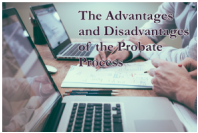
Advantages:
- Probate gives a court-accepted valuation of all of the decedent’s property.
- Placing a value on property at the time of the death of an individual can be extremely important for tax reasons. When an individual dies and passes property on to a beneficiary, the tax basis in that property is raised to whatever the property’s value would be on the day the decedent died. This is important for calculating taxes when the property is sold. In general, tax is collected on income, or in this case, ‘gains.’ That is to say, on the difference between the tax basis and the sales price. A higher basis means less gain, which means less tax. By creating a court-accepted valuation, probate gives the beneficiaries a clear number to use for basis when they go to sell the asset years in the future. Without this valuation, the beneficiaries must somehow show what the value was on the decedent’s date of death. This can be challenging if the beneficiary does not get the property valued.
- Examples of property that may need valuation: Real estate, if the assessed value seems too low; closely held businesses; collectibles; and other hard to value assets.
- Probate sets a timer on all claims against the estate.
- Most claimants have a limit of three months to bring a claim against the estate. However, it is the personal representative’s (the person who you pick to handle your probate) duty to make sure that all creditors are informed about your probate. This is not a process designed to dodge claims. The probate process is an upfront way to make sure that all claims have been paid before distributing property.
- Due to changes in the Wisconsin Estate Recovery procedures, it is currently best to go through probate in order to deal with claims from the state, rather than to deal with the state outside of probate. The state has failed to put any procedures in place for contesting their claim outside of probate. The revocable trusts set up by Heller-Neal Law Offices, LLC, take this into account, and allow distribution to the estate in the event of any claims by the Estate Recovery program.
- Probate takes time.
- Probate takes a minimum of approximately four months to complete. Often, probate can take from four to nine months to complete, due to time spent getting the signatures of heirs and beneficiaries, having hearings, dealing with creditors, inventorying and accounting for the estate, and distributing assets. During the initial three to four months, the assets are not able to be distributed, so as to give creditors an opportunity to assert their claims. Therefore, not only will someone need to manage your estate for four to nine months, but your beneficiaries do not even get to see any money from your estate during much of that time.
- Probate can be costly.
- Probate filing fees of $200 per every $100,000 of property you own.
- Attorney fees of approximately $1500 to $4000 for handling an uncontested probate.
- Double the above costs in the event that you have property in more than one state, as each state will require its own probate. Approximately an additional $1500 to $5000
- Probate is not private.
- Any assets that pass through probate are a part of the public record. Further, all heirs and beneficiaries of your estate are given notice of the estate and the assets in the estate. This includes exactly how much is given to whom. Passing assets through a trust or other form of nonprobate transfer avoids the need to give this information to everyone. This results in greater privacy.

 RSS Feed
RSS Feed